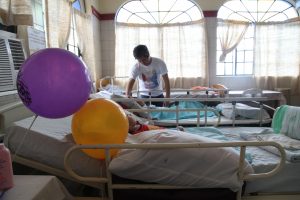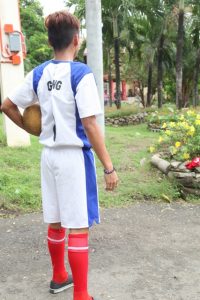
The sprawling facility located in Alabang, Muntinlupa serves as the only government institution that provides care and rehabilitation to abandoned, neglected, dependent, and foundling children as well as adults with special needs such as those with Autism Spectrum Disorder, Cerebral Palsy, Down Syndrome, and other intellectual disabilities and neuro-developmental disorders.
On February 3, 1964, an American couple, Samuel and Elsie Gaches, donated to the Philippine government their 16-hectare-lot rest house to be used as shelter for the needy. From then on, the facility has evolved to become what it is today: a haven for mentally-challenged persons.
The residents of Elsie Gaches Village (EGV) are able to lead normal lives because of the nurturing environment the center provides through its various services and programs – namely social, health, educational, psychological, productivity, home life, recreational, developmental services and spiritual programs.
There are also paramedical, psychiatric, dietary, and occupational therapy. The center also conducts music and art therapy programs, skills training, and sports activities.
Nurturing environment

Maria Villa (not her real name), 35, was abandoned by her family. She has been staying at EGV since 1997.
When asked what keeps her busy at the center, she replied, “Tumutulong po ako sa paglilinis ng aming cottage, paghuhugas ng mga pinagkainan at sa iba pang mga gawain (I help clean our cottage, wash dishes, as well as other chores).”
Aside from helping the house parents Maria also enjoys gardening; she plants vegetables as well as ornamental plants.
“Gardening is a good therapy for them,“ says Amor Macapanpan, Social Welfare Officer III. She has been with EGV for only a year, but she has actually made the round of different centers managed by the DSWD.
Another resident, Melba Santos, 24, has been staying at EGV since 2001. Like Maria, she also does chores in the center.
According to Amor, Melba and her sister were abandoned by their parents. Her younger sister, Minda, was adopted by an American couple. In the meantime, Melba, who is a PWD was endorsed to Nayon ng Kabataan, another DSWD-run center. She was later on transferred to EGV.
Last July, Minda visited her sister while on a trip to the Philippines. Melba wistfully said, “Sana kunin na ako ng kapatid ko para magkasama na kami (I wish my sister would come for me and take me with her so we can be together”).
On the other hand, Arnold Guzman, 20, arrived in EGV in 2007. He was already adopted by an American couple, but when they found out that the boy had bipolar disorder, they opted to have him repatriated.
Since he has shown keen interest in sports, particularly soccer, Arnold became a member of the EGV soccer team composed of 15 players.
Along with residents from other centers, he has already participated in tournaments like the Alaska Tournament sponsored by Ayala Malls and in the Special Olympics held in California, USA.
“Nakasali din po kami sa ibang tournaments katulad noong ginawa sa La Union at sa mga schools (We have already competed in other tournaments, like the one held in La Union and in schools),“ Arnold happily narrated.
The EGV soccer team practices on Mondays, Wednesdays, and Fridays every 5 in the afternoon.
Maria, Melba and Arnold are one in saying that the “social workers and house parents are all kind and we are happy here at the center).”
However, they still yearn for a family they can call their own even through adoption but which come few and far between. This is probably because of the difficulty of caring for a child with special needs.
Wish List
The social workers at EGV have compiled a wish list comprising of items badly needed at the center.
“We hope that kind-hearted individuals and groups could provide some of these items which we could no longer afford to buy because of budget constraints ,” explained Amor. They also need clothes (t-shirts, shorts, sando, pajama), mats/blankets, towels, toiletries. She also mentioned the need for cleaning materials, kitchen utensils, medicines, office equipment, oxygen tanks, emergency lights, high-speed sewing machine, gardening tools, sound system, and sports equipment.
Aside from material things, the center is also appeal to public and private donors to sponsor outdoor activities of residents. They said that it would do the residents much good if they had occasional opportunities to go on camping and community trips. It would also be beneficial for them if they could attend educational trips and socialization activities.
They also need sponsors for sports training on bowling and gymnastics.
“Actually, mahaba po ang mga listahan ng mga pangangailangan namin dito sa center (Actually, we have a long list of things needed here at the center),” Amor added.
EGV’s budget for 2016 is P36,561,525. Out of this amount, P29,728,701.21 has been obligated for the over-all operations of the center.
Issues and challenges
Because of the undeniable need for additional support, the social workers and house parents at the EGV double their effort to teach the residents become independent.
To date, the EGV has 14 cottages and a halfway house that provide shelter to 625 residents, more than its actual 470 bed capacity.
According to Amor, each cottage should only house 30 residents, but with the current number, 60 individuals now stay in all the cottages except for two.
Of the 625 residents, 284 are females and 341 are males.
“We also need at least P1 million for the construction of a new admission cottage,” she explained.
When asked why a single cottage costs so much, she replied that the two-story structure should be made of sturdy -materials, such as cement, bricks, and stones.
The center is also understaffed with only six social workers directly handling the cases. The ideal ratio is one social worker for every 25 clients, but since EGV now has 625 residents, each social worker is handling 80 cases.
EGV currently has 119 house parents, with 44 receiving their salaries from private corporations. In the meantime, 36 are regular employees, 26 are MOA workers, nine are contractual, while four are job order.
“We badly need additional manpower to ensure that the residents’ needs are met,” Amor emphasized.
DSWD Secretary Judy M. Taguiwalo appeals to corporations and generous individuals to donate or volunteer, just like what social media advocate Mocha Uson is doing at the Reception and Study Center for Children (RSCC) and GRACES, two of the Department’s institutions for abandoned and neglected children, and older persons, respectively.
“Kailangan ng mga residente sa aming mga centers ng kalinga at pagmamahal, natutuwa sila kapag may bumibisita at kumakausap sa kanila, kaya’t sana ay may mga magboluntir na indibidwal o mga grupo (The residents in our centers need loving care. They are happy whenever people visit and talk to them, so I hope there are individuals and groups who would care to volunteer).”
“Patuloy din ang pag-aaases sa mga centers upang matukoy ang mga kakulangan at masolusyunan ang mga ito (The assessment of centers is ongoing to determine what is lacking and provide solutions for these),” Sec. Taguiwalo emphasized.
The EGV staff are hoping that with the new administration, the problems which they are facing on a daily basis will be resolved soon. #


